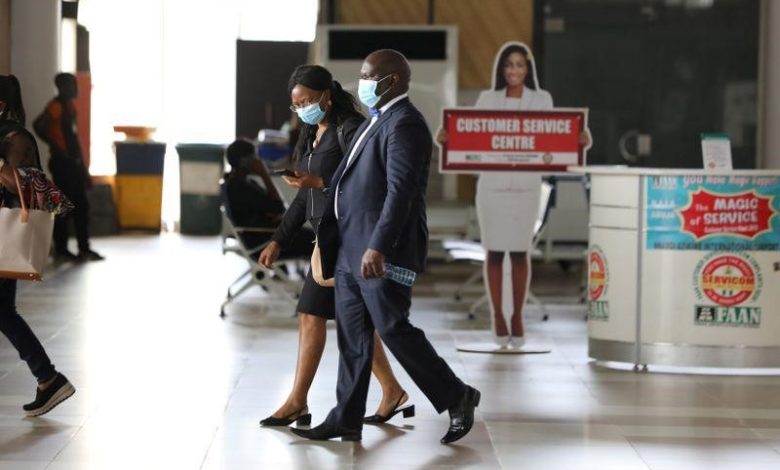New Flight Protocols Working Seamlessly, Says FAAN Boss

The Federal Airports Authority of Nigeria (FAAN) has commended air travellers for quickly adapting to new protocols put in place in July due to the COVID-19 pandemic.
Addressing journalists at a press conference on Thursday, the Managing Director, Rabiu Yadudu, said the protocols had been working seamlessly.
“The cooperation of air travellers has been particularly impressive. We shall continue to urge all airport users to comply with the new policies and help keep the travelling public, and our nation, safe and healthy,” Yadudu said.
“We shall continue to review and update our COVID-19 protocols in line with the updates from the World Health Organization (WHO). Together, the world would join forces and overcome this pandemic.”
He added that the Federal Government had substantially invested in the aviation sector to improve safety.
While five new terminals have been completed, others are at advanced stages of completion, he said. He assured that some runways were also being reconstructed.
The first case of COVID-19 was confirmed in Nigeria in February and over 1,000 people have died from the disease.
As of Friday, August 28, Nigeria had recorded 53,317 COVID-19 cases with 11,580 still active according to the Nigeria Centre for Disease Control.
The government closed the airports in March and has scheduled the resumption of international flights for September 5 after approving the resumption of domestic operations from June 29.
However, Yadudu admitted that a few highly-placed Nigerians had violated the new orders.
When the government announced the air travel ban on March 23, it stated that returning citizens and others entering the country must go into isolation or quarantine for 14 days to determine their health status before mixing with other members of the society to avoid spreading the novel coronavirus.
Apart from the observance of safety protocols in breach, especially among influential members of the society, including the late Chief of Staff to the President, Mr Abba Kyari, Nigerians found a way round the guidelines to live as they wished.
A HumAngle investigation revealed that citizens travelled in and out of the country in connivance with airlines, travel agents and other groups under dubious and suspicious circumstances, especially when the evacuation of stranded Nigerians abroad started in May using chartered flights.
HumAngle learnt that to avoid being quarantined on arrival into the country for 14 days, most returning Nigerians routed their flights to neighbouring West African countries with less stringent COVID-19 safety protocols and completed their trips by road through the land borders.
Meanwhile, FAAN is set to begin the implementation of the new Passenger Service Charge (PSC) for domestic and international flights, as part of overall measures to bolster revenue generation.
FAAN’s revenue has fallen by about 95 per cent due to the impact of COVID-19, and other cost-related increases.
The PSC increase, which would become effective on Tuesday, September 1, would culminate in a 100 per cent increase for domestic passengers, who would thereafter pay N2,000 instead of N1,000.
Flights within the West African sub-region will attract 50 dollars per passenger as against the current 20 dollars, while international flights outside the region will move from 50 dollars to 100 dollars.
Yadudu noted that the current N1,000 PSC was no longer sustainable as it did not correlate with realities of cost-related inflation, which the Central Bank of Nigeria (CBN) put at 12.82 per cent.
He said, “FAAN, until late 2019, was collecting the naira equivalent of PSC at an official rate of N305.50-N344.38 to a dollar when airlines were collecting a subsisting market rate of N360 to a dollar.”
According to him, the International Civil Aviation Organisation (ICAO) recommendation in Doc. 9562 stipulates that revenue generated by airports be transparently re-invested wholly in operating and developing facilities
Yadudu stated that the Federal Government was increasing its direct deduction from FAAN to 40 per cent from 2021 and with such deduction, the agency would have a shortfall of more than N16 billion on overhead cost.
“The authority is, however, engaging the Federal Government to exempt her from this deduction. It has therefore become imperative to review the Passenger Service Charge (PSC) from N1,000 to N2,000 per passenger.
“This review, which takes effect from 1st September, 2020, has already been communicated to the airlines.
“We therefore implore stakeholders, airport users and the general public to bear with us as FAAN is laden with so much overhead cost of operation,” he said.
Support Our Journalism
There are millions of ordinary people affected by conflict in Africa whose stories are missing in the mainstream media. HumAngle is determined to tell those challenging and under-reported stories, hoping that the people impacted by these conflicts will find the safety and security they deserve.
To ensure that we continue to provide public service coverage, we have a small favour to ask you. We want you to be part of our journalistic endeavour by contributing a token to us.
Your donation will further promote a robust, free, and independent media.
Donate HereStay Closer To The Stories That Matter




